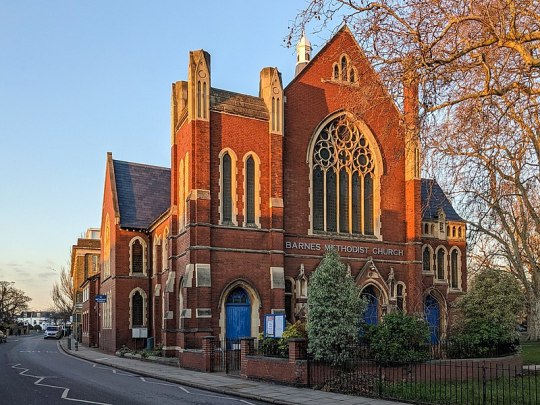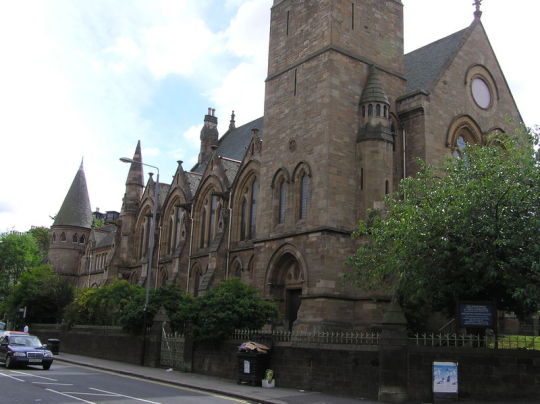#reformed presbyterians
Explore tagged Tumblr posts
Text
Defending the Gospel: Sound Doctrine Essentials
Titus 1:9-16 (NASB20) 9 holding firmly the faithful word which is in accordance with the teaching, so that he will be able both to *exhort in sound doctrine and to refute those who contradict [it.] 10 For there are many rebellious people, empty talkers and deceivers, especially those of the circumcision, 11 who must be silenced because they are upsetting whole families, teaching things they…
youtube
View On WordPress
#Christian#Christianity#church#God#Jesus Christ#preacher#REFORMED AUDIO SERMON#reformed audio sermons#reformed christian audio#reformed christian faith#REFORMED CHRISTIAN PREACHERS#reformed christian sermons#reformed christianity#reformed pastor#reformed presbyterians#reformed video sermons#Youtube
0 notes
Text
Roman Catholics and Orthodox have got to knock it off with "Protestants have brutalist corporate churches". A particular modern strain of Protestantism has hideous modern churches. It's a depressingly common strain, and arguably the dominant one in America, but it's either ignorant or dishonest to pretend as though all Protestants have ugly churches.
Behold:




Clockwise from top left:
St. Peter's Church, Geneva, canton of Geneva, Switzerland (Swiss Reformed)
Barnes Methodist Church, London, England, UK (Methodist)
Dutch Reformed Church, Newbury, New York state, USA (Dutch Reformed)
St. Jude's Church, Glasgow, Scotland, UK (Presbyterian)
#i'm not arguing for protestantism#i am arguing for honesty and accuracy in apologetics#christianity#theology#churches#protestantism#swiss reformed#methodism#dutch reformed#presbyterian
168 notes
·
View notes
Text

“When we are out of the way of our duty we are in the way of temptation…Idleness gives great advantage to the tempter. Standing waters gather filth.”
— Matthew Henry; Commentary on 2 Samuel 11
71 notes
·
View notes
Text
Writers with a more historic Protestant perspective have generally translated the Greek word charis as "grace" and understood it to refer to the idea that there is a lack of human effort in salvation because God is the controlling factor. Proponents of the New Perspective argue that "favor" is a better translation, as the word refers normally to "doing a favor". In ancient societies there was the expectation that such favors be repaid, and this semi-formal system of favors acted like loans. Gift giving corresponded with the expectation of reciprocity. Therefore, it is argued that when Paul speaks of how God did us a "favor" by sending Jesus, he is saying that God took the initiative, but is not implying a lack of human effort in salvation, and is in fact implying that Christians have an obligation to repay the favor God has done for them. [...] "charis" as "favor" [does] not teach that Christians earn their way to heaven outside of the death of Christ. Forgiveness of sins through the blood of Christ is still necessary to salvation. But, that forgiveness demands effort on the part of the individual (cf. Paul in Phil. 3:12–16).
#christianity#bible#jesus#something to meditate on#faith in jesus#bible scripture#keep the faith#faith#jesus christ#christian#catholicism#protestantism#catholic#catholic church#reformed#presbyterian#lutheran#messiah#martin luther
24 notes
·
View notes
Note
I’m actually really interested in learning what your denomination thinks about sanctification if you feel up to a long post about it? (Ulterior motive: I wanna go through and find the parts where Catholics disagree/define sanctification differently.)
Sorry for taking so long to reply! Thank you for your patience, and thanks for asking!
To some degree, Wesleyan theology does treat salvation as something that's immediate, with John Wesley writing at one point, "It [salvation] is not something at a distance, It is a present thing, a blessing which through the free mercy of God you are now in possession of."
But Wesleyan theology (and I'd argue Scripture itself too) also holds that even then, justification is just the beginning, and we are continually being perfected by God's grace.
This is how John Wesley put it in The Scripture Way of Salvation:
From the time of our being "born again," the gradual work of sanctification takes place. We are enabled by the Spirit to "mortify the deeds of the body" (Romans 8:11, 13) and of our evil nature, and as we are more and more dead to sin, we are more and more alive to God.
In other words, God's grace and the power of the Holy Spirit slowly transform our deeds and desires, so that we become more and more like Christ.
In the Wesleyan understanding of sanctification, sanctification takes place as believers grow to love God more. We draw a lot on St. John's language of "being perfected in love" in 1 John 4.
This is how love is made perfect in us, enabling us to have confidence on the Day of Judgment, because even in this world we have become like him. In love there is no fear; indeed, perfect love casts out fear, because fear has to do with punishment, and whoever fears has not yet achieved perfection in love. Therefore, we love because he first loved us. (NCB, v. 17-19)
Effectively, as we grow to know and love God more, we find our desires transformed. Sin becomes less and less attractive. We no longer want the same things that we wanted before, and instead our desires are increasingly aligned with the will of God.
And that is effectively what Christian perfection (or "being perfected in love", or "entire sanctification"... Wesley didn't tend to stick with one term for things) means. It's the point where there's no more room in one's heart for sinful desires, because one is that full of the love of God. Irish theologian William J. Abraham described it as, "the point in [someone's] relationship with God where disobedience [i]s no longer a live option for them."
It's worth pointing out that this perfection is not absolute. We're finite creatures, after all. We get into misunderstandings, lack knowledge, etc. and so as a result, we'll still end up sinning. But Wesleyan theology places a distinction between these sorts of sins and the intentionally-done sort of sins we are freed from when we are perfected in love. (From what I understand, Catholic theology has a similar distinction between venial sins and mortal sins.)
This is distinct from Presbyterians and most Baptists (both within the same umbrella of Protestant theology), where entire sanctification is something we never quite attain in life. Even so, a Baptist or Presbyterian might argue, we still are called to keep "running the race", to use St. Paul's analogy.
Hope this helps!
#i waffled on whether to call baptists 'reformed' because 'reformed' tends to also mean 'calvinist'#and not all baptists are calvinist#but they do have a shared theological heritage with presbyterians and congregationalists and such#just wesleyan things#christianity tag#general protestantism tag
15 notes
·
View notes
Text
Lord, I Believe! Help My Unbelief!
In Mark 9:14-29, the weakness and limit of men is demonstrated, especially with regard to faith, and so is the answer to men's weakness:
Luke 17:5 (KJV), "And the apostles said unto the Lord, Increase our faith."
Mark 9:24, "And straightway the father of the child cried out, and said with tears, Lord, I believe; help thou mine unbelief."
“A weak faith may also be true faith, when it is otherwise of the right kind. A fire is not at once a bright blazing flame, but it often starts with a single spark.” - Otto Thelemann, An Aid to the Heidelberg Catechism, 79
Hebrews 12:2a, "Looking unto Jesus the author and finisher of our faith."
Notice what the Epistle to the Hebrews tells us, that Christ doesn't just finish or complete it but is the one who gives us the faith to begin with. This is why the Westminster Shorter Catechism puts it this way:
Question 86: What is faith in Jesus Christ?
Answer: Faith in Jesus Christ is a saving grace, whereby we receive and rest upon him alone for salvation, as he is offered to us in the gospel.
It is a saving grace, meaning it wholly begins with the gracious act of God, and doesn't begin with man or his acceptance. It is strengthened by Christ who works it in us by His Spirit completing that work at our death.
Praise God, our salvation relies not upon any faith made by the strength of men, but on a faithful Savior who is powerful, mighty, and gracious to save sinners.

18 notes
·
View notes
Text
What's really funny is when someone reblogs one of my posts (generally from another blog) so I look at their page and it's like "Christians DNI" "Catholics DNI" 💀
My dear human, what in the cinnamon toast crunch frick—
#why are you reblogging from me lol why#and like maybe you didnt know but also. being told i cant even talk to you because of my religious beliefs is so dehumanizing actually#so maybe figure out that im catholic before you reblog my stuff and then say i cant touch yours. just a thought#i try to be gracious. im constantly surrounded by reform presbyterians. i dont expect everyone to bow to my beliefs#but being told that i cant even talk to you because i have a belief system thats not the same as yours is. different#catholic#christian#rant
25 notes
·
View notes
Text

7 notes
·
View notes
Text
Shirt that says I ♥️ LEARNING ABOUT PROTESTANT INFIGHTING
9 notes
·
View notes
Text
I understand paedobaptists arguing that paedobaptism is indeed biblical when baptists claim that it's not, even if I don't agree. What I don't understand is them coming at us with "oh yeah?! Well I went to a Baptist church once that did something I consider unbiblical!" (even though in most cases it's extrabiblical at best) as if
1) I have to answer for any church other than my own (I don't)
2) one church's incorrect doctrine makes another's okay (it doesn't)
I usually respond with "You're right, you shouldn't do either of those things"
#they usually go with baby dedication which many churches dont do and is in no way sinful#or altar calls which many churches also don't do and is also not necessarily sinful#my current and previous church have done neither of those things and they are reformed baptist#and when reformed presbyterians try to come at baptists with accusations that apply to regular or fundie baptists ....#okay???? im neither of those things
10 notes
·
View notes
Text
youtube
On 29th June 1559 John Knox preached a sermon in St Giles Edinburgh, that some regard as the real starting point of the Scottish reformation.
Knox is arguably the most famous Scottish Reformer, he was born at Giffordgate, East Lothian in 1505. and went to his local school and then to university in St Andrews, before becoming a deacon and a priest in the Catholic Church.
From 1542, Scotland was governed by Regent Arran as Mary Queen of Scots [link to First Reformation – Monarchs – Mary QOS] was still a baby. Arran benefited reform in Scotland in a number of ways. Firstly, he passed a law that allowed people to read the Bible in their own language. He then appointed the Protestant Thomas Guillame to preach around Scotland, and it was through his preaching that John Knox was converted. The biggest influence on Knox’s life however was George Wishart.
After Wishart’s was martyred in 1546, Knox taught the sons of a number of Protestants who had captured St Andrews Castle. Some of those in the castle called Knox to become their minister. At this he burst into tears and ran off to his room because of what a responsibility he knew it would be. A few days later however he accepted the call. In the summer of 1547 French warships attacked the castle. Knox was taken prisoner, kept aboard in one of the ships and forced to row it in chains with other galley slaves. After 19 months however he was set free, and went to England where he was appointed as a preacher in Berwick. He attacked the Roman Catholic mass as idolatry because it was ‘invented by the brain of man’ and not commanded by God. In 1551 he was invited to live in London and preach before king Edward VI.
In 1553, the Mary I became Queen. Knox felt his life was now in danger so he left for Europe becoming a minister in Frankfurt in Germany and then in Geneva in Switzerland where John Calvin was also a minister. In between he returned to Scotland to get married and preach, and was surprised at how far the teaching of the Reformers was spreading.
The short clip is John Knox outside St Giles preaching.
#scotland#scottish#history#preacher#presbyterian#religious figure#the scottish reformation#religious history#Youtube
4 notes
·
View notes
Text
Jehovah Jesus - Christian Praise & Worship Song / Pastor Patrick Hines (Intro) Rich Moore Music
▶️Pastor Patrick Hines has recently had a brand new book published, called, “Earth’s Foundational History – Part 1: Genesis Chapters 1 Through 5.” (Paperback – May 4, 2023) https://cutt.ly/16RCeZ0 These two books are also available on Amazon. All proceeds go directly to Pastor Hines: ▶️Am I Right With God?: The Gospel, Justification, Saving Faith, Repentance, Assurance, & The New Birth…

View On WordPress
#Christian#Christianity#GIBSON LES PAUL#God#Jesus Christ#les paul standard#pastor#praise#praise songs#preacher#presbyterian church tennessee#Presbyterians#reformed presbyterians#singer#songwriter#Worship songs
0 notes
Text
I’ve just been confirmed by the laying on of hands from an Episcopal bishop so I’m officially Anglican now. Dreams really do come true.
#got a certificate and everything#leaving the Presbyterian church behind forevermore#apostolic succession and reformed sacramental theology my love#(plus I turned pages for the organist and she said I was perfect)#church saga
8 notes
·
View notes
Text

40 notes
·
View notes
Text
“It is fit that God should be glorified whatever becomes of you. You are dear to God, but God’s name is dearer to Him than you are…You have had a great loss and affliction upon you, but God has had glory. God has glorified Himself.”
Jeremiah Burroughs, Gospel Worship, p. 10. https://heritagebooks.org/products/gospel-worship-burroughs.html
6 notes
·
View notes
Text
A Brief Look At Presbyterians!
0 notes